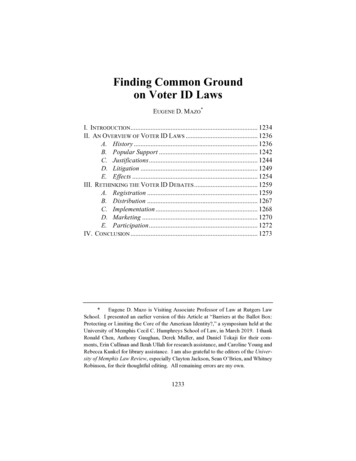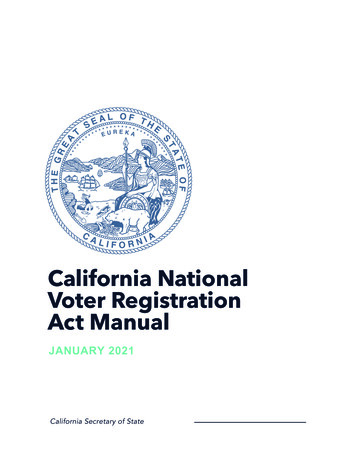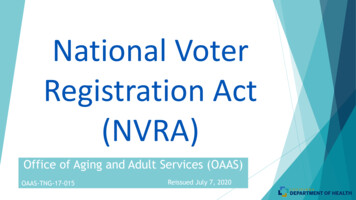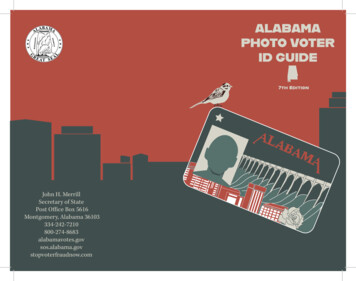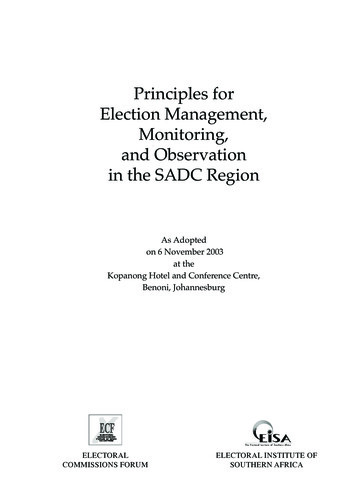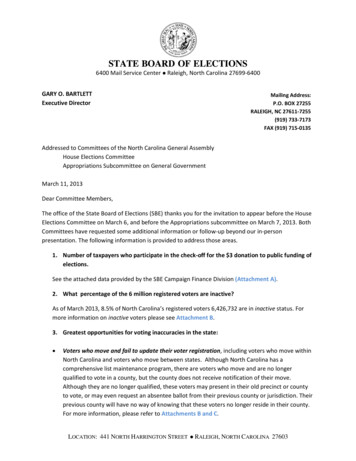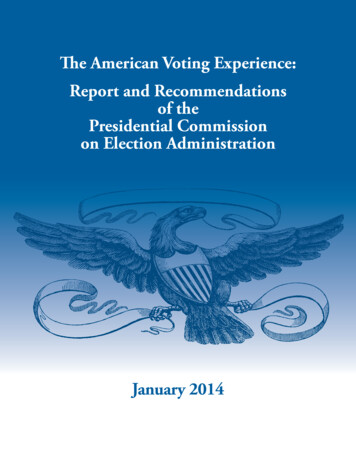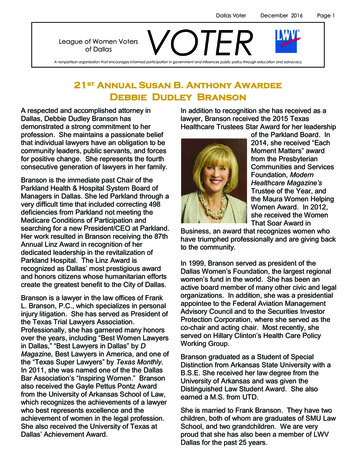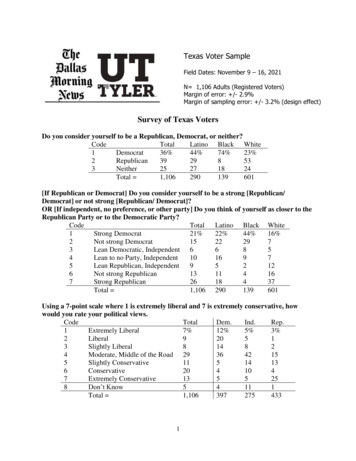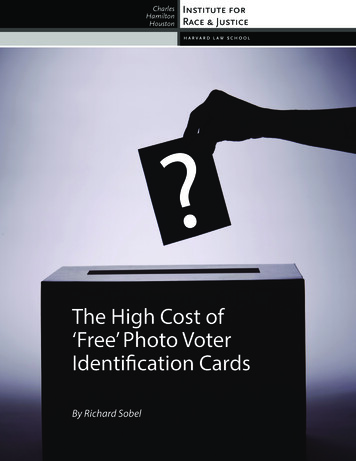
Transcription
A VOTER’S GUIDE TO POST-FRENCHAND INDIAN WAR POLICYAUTHOR: Kyle Johnson / Seaman Middle School, Topeka, KansasGUIDING QUESTION:How did the French and Indian War influence colonial attitudes toward British rule?OVERVIEWDuring the French and Indian War (1754–1763), Englandand France vied for control of North America. After earlydefeats, William Pitt, British Secretary of State, turned thetide of the war in England’s favor, which ultimately led tovictory. In the 1763 Treaty of Paris, France gave Englandall French territories in North America. However, Pitt’sstrategy left the British government with substantial debt.To recoup the losses from the French and Indian War andeffectively govern their growing territory in North America,the British government taxed their colonies to pay for thedebt, limited colonial expansion to appease indigenousgroups, and quartered British soldiers in North Americato protect the colonies. While the British saw these asnecessary actions, their campaign angered many Americancolonists. By the 1760s, early rumblings of protest spreadthrough the colonies. Soon, the British faced another war inNorth America—this time with its own colonists.OBJECTIVESAt the conclusion of this activity, students will be able to›Explain the lasting impacts of the French and Indian War;›Analyze how events of the French and Indian Waraffected colonial attitudes toward British rule; and›Complete a mock voter registration form and justify one’sposition using primary source evidence.STANDARDS CONNECTIONSCONNECTIONS TO COMMON CORE›CCSS.ELA-LITERACY.RH.9-10.3 Determine the centralideas or information of a primary or secondary source;provide an accurate summary of how key events or ideasdevelop over the course of the text.›CCSS.ELA-LITERACY.RH.9-10.4 Determine the meaningof words and phrases as they are used in a text, includingvocabulary describing political, social, or economicaspects of history/social science.CONNECTIONS TO C3 FRAMEWORK›D2.His.12.6-8. Use questions generated about multiplehistorical sources to identify further areas of inquiry andadditional sources.›D3.1.6-8. Gather relevant information from multiplesources while using the origin, authority, structure,context, and corroborative value of the sources to guidethe selection.DOCUMENTS USEDPRIMARY SOURCESAddress, New York General Assembly, Petition to the RoyalGovernor, Sir Henry Moore, December 15, 1766 (excerpt)The History of the War in America, Between Great Britain andHer Colonies from Its Commencement to the End of the Year 1778https://www.google.com/books/edition/The History of the War in America Betwee/MV9KAAAAYAAJ?hl en&gbpv 0“Americanus” (Joseph Galloway), letter to The New-YorkGazette, August 15, 1765 (excerpt)Exchange Between Governor Thomas Hutchinson and theHouse of Representatives, January 6, 1773 (excerpt)Teaching American son-and-the-house-of-representatives/1
John Dickinson, Letters from a Farmer in Pennsylvania, 1767(excerpt)Empire and Nation: Letters from a Farmer in mpire and nationLetters from a farmer.html?id 64sGAQAAIAAJLetter, George Washington to William Crawford, September 21,1767 (excerpt)George Washington Papers, Library of Congresshttps://www.loc.gov/resource/mgw5.116 0373 0628/?sp 14PROCEDUREACTIVITY ONE (30 MINUTES)›Distribute one Post-French and Indian War Voter’s Guidepacket to each student.›Project the political cartoon, The Colonies Reduced, and askstudents to label the images they see in the cartoon.›Explain to students that this cartoon is attributed toBenjamin Franklin, who was in England arguing against theStamp Act.Poem, Hannah Griffitts, “The Female Patriots”Poetry sPolitical Cartoon, Benjamin Franklin (attributed), The ColoniesReduced - Its Companion, 1767Library of Congress 672618/The Quartering Act of 1765 (excerpt)Digital History, University of Houstonhttp://www.digitalhistory.uh.edu/disp textbook.cfm?smtID 3&psid 3959›Speech, Pontiac Calls for War, 1763 (excerpt)Collections of the Pioneer Society of the State of al-society/pontiac-calls-for-war-1763/The Proclamation of 1763Digital History, University of Houstonhttp://www.digitalhistory.uh.edu/disp textbook.cfm?smtID 3&psid 159Soame Jenyns, The Objections to the Taxation of our AmericanColonies by the Legislature of Great Britain, 1765 (excerpt)Monticello Digital em/objections-to-taxation/SECONDARY SOURCES»The Stamp Act, the first direct tax following the Frenchand Indian War, was passed by the British Parliamentin 1765. It required colonists to pay a tax on printedmaterials including newspapers, legal documents, andeven playing cards. The tax helped recoup the financialdebts incurred during the war.»The Latin phrase “Date Obolum Bellisario” means “Give afarthing to Belisarius,” which references the Byzantinegeneral, who won great victories for the ByzantineEmpire but was reduced to extreme poverty later in life.Lead a discussion about the political cartoon. Discussionquestions:»Why was it necessary for Great Britain to tax the coloniesfollowing the French and Indian War?»What about Franklin’s image indicates his position regardingthe Stamp Act? How does the reference to Belisarius connectto the colonists’ position?»What other British policies implemented following the Frenchand Indian War angered the colonists?›Project the video clip, The French and Indian War Explained(3:22). Students will watch the video clip and answer thereview questions listed in their Post-French and Indian WarVoter’s Guide.›Review answers after the video has concluded.›Ask what new questions do students have or what newideas do students want to investigate further.Video clip, The French and Indian War Explained, 2020 (3:22)HISTORY https://www.youtube.com/watch?v 9n-gsgqaUo0TEACHER-CREATED MATERIALS›Post-French and Indian War Voter’s Guide›Voter’s Guide AssessmentACTIVITY PREPARATION2›Make one copy of the Post-French and Indian War Voter’sGuide packet for each student.›Arrange the classroom for group work.›Organize students into groups of three or four studentseach.CONNECTIONSThe struggle for American independence wasfar from certain, and it was far from the lasttime Americans were divided over politicalissues. This book features lessons about thedebates over abolition, suffrage, women’srights, immigration, and civil rights. Debate is akey component of American democracy.
ACTIVITY TWO (30 MINUTES)›››Explain to students that when the presidential electionapproaches, all parties sit down and create platforms toexplain their points of view on the major domestic andforiegn policy issues. Often the two major parties haveplatforms in opposition to each other (one party supportsan idea while the other party opposes the idea). However,voters do not always fall neatly into one category oranother.Students will complete a political quiz on British policyfollowing the French and Indian War. Each policy statementwill have a “Learn More” section that includes opinions inthe form of primary source documents.Explain that students should read the policy issues, consultthe primary documents related to the issue, and then selectthe answer to the policy question and explain why theyselected their answer in the “Explanation” section.»›Teacher Tip: This activity can be completed as a classor can be assigned to groups. If completing in groups, itmay be jigsawed.STUDENTS INTERESTED IN THISTOPIC MIGHT BE INTERESTED INRESEARCHING THE FOLLOWING FORAN NHD PROJECT›Pontiac’s Rebellion›The Quartering Act (1765) or the Declaratory Act (1766)›The Boston Tea Party›The Intolerable Acts (1774) or the Olive Branch Petition(1775)To access a PDF containing all of the sourcesand materials to complete this lesson plan, go to:WWW.NHD.ORG/250Review student responses as a class. Discussion questions:»What was the British rationale for enacting such policiesfollowing the French and Indian War?»How did British policies following the French and Indian Wareventually lead to unrest in the colonies, and ultimately theAmerican Revolution?»What questions do you have about the position of the Britishor the American colonists?ASSESSMENT OPTIONS›Assign the Voter’s Guide Assessment.Lesson Plan: Colonial Broadsides and the American colonial-broadsides-and-american-revolutionLesson Plan: Empire and Identity in the American pire-and-identity-american-coloniesHumanities Feature: The History of the Stamp Act Shows How Indians Led to the American indians-led-the-american-revoMedia Resource: Coming of the American rces/coming-american-revolution3
POST-FRENCH AND INDIAN WAR VOTER’S GUIDEACTIVITY ONEPOLITICAL CARTOON, BENJAMIN FRANKLIN (ATTRIBUTED), THE COLONIES REDUCED - ITS COMPANION, 17674
POST-FRENCH AND INDIAN WAR VOTER’S GUIDE (CON’T)ACTIVITY TWOWhile watching the video clip, The French and Indian War Explained, answer the following questions.What did colonial powers want to gain in the new world?In what direction did France seek to expand its colonies in North America? What about England?What area did these countries eventually fight over, leading to the start of the French and Indian War?Who led the British colonial forces in the first engagement of the French and Indian War, the Battle ofJumonville Glen?Which American Indian confederacy allied itself with the British during the war?Who was the British secretary of state whose war policies turned the French and Indian War in favorof the British?After winning the French and Indian War, what did the British gain in the Treaty of Paris (1763)?What did the British do in response to the massive war debt incurred from the French and Indian War?Why was the French and Indian War one of the most consequential wars in American history?5
POST-FRENCH AND INDIAN WAR POLITICAL QUIZAnswer the following questions to see how your political beliefs align with British colonial policy.Question OneShould King George III rescind the Royal Proclamation of 1763?YesNoExplanation:What questions does this policy generate?HISTORICAL CONTEXTPontiac was a leader of the Ottowa Nation who fought the British Army in the Great Lakes region andattempted (unsuccessfully) to overtake Fort Detroit. Following Pontiac’s War, the British governmentissued the Royal Proclamation of 1763, which limited settlers’ ability to move west beyond theAppalachian Mountains. The British government hoped that the proclamation would limit conflict withNative American groups. However, colonists desired the settlement opportunities and natural resourcesoffered by the land.6
POST-FRENCH AND INDIAN WAR POLITICAL QUIZ (CON’T)QUESTION ONE: LEARN MOREOpinion OneExcerpt from a letter from George Washington to William Crawford, September 21, 1767“The other matter, just now hinted at and which I proposed in my last to join you in attempting to secure some ofthe most valuable Lands in the King’s part which I think may be accomplished after a while notwithstanding theProclamation that restrains it at present and prohibits the Settling of them at all for I can never look upon thatProclamation in any other light (but this I say between ourselves) than as a temporary expedient to quiet the Mindsof the Indians and must fall of course in a few years especially when those Indians are consenting to our Occupyingthe Lands. Any person therefore who neglects the present oppertunity [sic] of hunting out good Lands and in somemeasure marking and distinguishing them for their own (in order to keep others from settling them) will neverregain it, if therefore you will be at the trouble of seeking out the Lands I will take upon me the part of securingthem so soon as there is a possibility of doing it and will moreover be at all the Cost and charges of Surveying andPatenting &c. after which you shall have such a reasonable proportion of the whole as we may fix upon at our firstmeeting as I shall find it absolutely necessary and convenient for the better furthering of the design to let some fewof my friends be concernd [sic] in the Scheme and who must also partake of the advantages.”Opinion TwoOpinion ThreeExcerpt from The Proclamation of 1763Excerpt from Pontiac Calls for War, 1763“WHEREAS WE have taken into Our Royal Considerationthe extensive and valuable Acquisitions in America,secured to Our Crown by the late Definitive Treaty ofPeace, concluded at Paris.and being desirous that all Ourloving Subjects.may avail themselves with all convenientSpeed, of the great Benefits and Advantages which mustaccrue therefrom to their Commerce, Manufactures, andNavigation, We have thought fit.to issue this Our RoyalProclamation.“I am the Master of Life, whom thou desirest to knowand to whom thou wouldst speak This land, where youlive, I have made for you and not for others. How comesit that you suffer the whites on your lands? Can you notdo without them? I know that those whom you call thechildren of your Great Father supply your wants, but ifyou were not bad, as you are, you would well do withoutthem. You might live wholly as you did before you knewthem. Before those whom you call your brothers comeon your lands, did you not live by bow and arrow? Youhad no need of gun nor powder, nor the rest of theirthings, and nevertheless you caught animals to live andclothe yourselves with their skins, but when I saw thatyou inclined to the evil, I called back the animals intothe depths of the woods, so that you had need of yourbrothers to have your wants supplied and I shall sendback to you the animals to live on. I do not forbid you, forall that, to suffer amongst you the children of your father.I love them, they know me and pray to me, and I givethem their necessities and all that they bring to you, butas regards those who have come to trouble your country,drive them out, make war on them. I love them not, theyknow me not, they are my enemies and the enemies ofyour brothers. Send them back to the country which Imade for them. There let them remain.”And whereas great Frauds and abuses have beencommitted in the purchasing Lands of the Indians, tothe great Prejudice of Our Interests, and to the greatDissatisfaction of the said Indians; in order to preventsuch Irregularities for the future, and to the End that theIndians may be convinced of Our Justice and determinedResolution to remove all reasonable cause of Discontent,We do.enjoy and require that no private Person dopresume to make any Purchase from the said Indians ofany Lands reserved to the said Indians.”7
POST-FRENCH AND INDIAN WAR POLITICAL QUIZ (CON’T)Answer the following questions to see how your political beliefs align with British colonial policy.Question TwoShould the British government keep standing armies in theAmerican colonies and quarter British regulars in barracks andpublic houses (taverns, inns)?YesNoExplanation:What questions does this policy generate?HISTORICAL CONTEXTFollowing the French and Indian War, British General Thomas Gage had difficulties gettingcolonial assemblies to pay for provisions and lodging for British troops. Gage implored the BritishParliament to act. The Quartering Act of 1766 required colonists to house British troops inbarracks and inns. No British standing army had ever been quartered in North America duringpeacetime. Colonial political thought favored the use of local militia forces over standing armiesduring times of peace.8
POST-FRENCH AND INDIAN WAR POLITICAL QUIZ (CON’T)QUESTION TWO: LEARN MOREOpinion OneExcerpt from the New York General Assembly’s Petition to the Royal Governor, Sir Henry Moore, December 15, 1766“We, His Majesty’s most dutiful and loyal Subjects, the General Assembly of the Colony of NewYork, have taken your Excellency’s message of the 17th of November last, into our most seriousConsideration: and beg Leave to assure your Excellency that nothing would give us a greater Pleasurethan to find it in our Power to comply with every Requisition tending in any manner to promote HisMajesty’s Service. It is therefore with great Concern that we find it impossible to comply with whatis now demanded, consistent with our Obligations to our Constituents [citizens of the colony].In theProvision we made last Session for quartering Two Battalions and one Company of Artillery, we loadedourselves with a Burden much greater than any of the neighboring Governments lie under for thatService, and imagined that, far from being censured on that Account, it would be accepted as a newInstance of that Loyalty and Affection to His Majesty’s Government, of which this Colony has exhibitedso many Proofs. We beg Leave, further, to represent to your Excellency that, by the Act of Parliament, itappears to be the Intention of the Legislature to provide for the quartering Soldiers only on a March; butaccording to the Construction [interpretation] put on it here, it is required that all the Forces which shallat any Time enter this Colony, shall be quartered during the whole Year, in a very unusual and expensiveManner: That by marching several Regiments into this Colony, this Expense would become ruinousand insupportable; And, therefore, we cannot consistent with our Duty to our Constituents, put it in thePower of any Person.to lay such a Burden on them.”Opinion TwoExcerpt from the Quartering Act of 1765“WHEREAS in and by an act made in the present session of parliament, intituled, An act for punishingmutiny and desertion, and for the better payment of the army and their quarters; several regulations aremade and enacted for the better government of the army, and their observing strict discipline, and forproviding quarters for the army, and carriages on marches and other necessary occasions, and inflictingpenalties on offenders against the same act, and for many other good purposes therein mentioned;but the same may not be sufficient for the forces that may be employed in his Majesty’s dominions inAmerica: and whereas, during the continuance of the said act, there may be occasion for marchingand quartering of regiments and companies of his Majesty’s forces in several parts of his Majesty’sdominions in America: and whereas the publick houses and barracks, in his Majesty’s dominions inAmerica, may not be sufficient to supply quarters for such forces ”9
POST-FRENCH AND INDIAN WAR POLITICAL QUIZ (CON’T)Answer the following questions to see how your political beliefs align with British colonial policy.Question ThreeShould the British Parliament continue to levy taxes on the coloniesto pay for debt incurred during the French and Indian War and indefense of the colonies?YesNoExplanation:What questions does this policy generate?HISTORICAL CONTEXTGreat Britain had a substantial war debt in the aftermath of the French and Indian War. The BritishParliament believed that the colonies, where much of the fighting occurred, should help pay the debt.American colonists, however, resented being taxed without having representation to vote on bills inquestion. American colonists believed strongly that local assemblies should have the authority to levytaxes, not the British Parliament in London. John Dickinson, a Pennsylvania lawyer and politician,advocated for independence and was heavily involved in the revolutionary movement. Soame Jenynswas a member of the British Parliament. Joseph Galloway represented Pennsylvania in the FirstContinental Congress, but remained loyal to the crown after his plan to remain part of the British empirewas rejected.10
POST-FRENCH AND INDIAN WAR POLITICAL QUIZ (CON’T)QUESTION THREE: LEARN MOREOpinion OneExcerpt from John Dickinson, Letters from a Farmer in Pennsylvania, 1767“There is another late act of parliament, which appears to me to be unconstitutional, and as destructive to the liberty of thesecolonies, as that mentioned in my last letter; that is, the act for granting the duties on paper, glass, &c. [the Townshend Act].“The parliament unquestionably possesses a legal authority to regulate the trade of Great-Britain and all her colonies. Suchan authority is essential to the relation between a mother country and her colonies; and necessary for the common goodof all. He, who considers these provinces as states distinct from the British empire, has very slender notions of justice, orof their interests. We are but parts of a whole; and therefore there must exist a power somewhere to preside, and preservethe connection in due order. This power is lodged in the parliament; and we are as much dependent on Great-Britain, as aperfectly free people can be on another.”Opinion TwoExcerpt from Soame Jenyns, The Objectionsto the Taxation of our American Colonies by theLegislature of Great Britain, 1765“.The great capital argument is this: that noEnglishman is, or can be taxed, but by his ownconsent: by which must be meant one of these threepropositions; either that no Englishman can be taxedwithout his own consent as an individual; or thatno Englishman can be taxed without the consent ofthe persons he chuses to represent him; or that noEnglishman can be taxed without the consent of themajority of all those, who are elected by himself andothers of his fellow subjects to represent them First then, that no Englishman is or can be taxed butby his own consent as an individual: this is so farfrom being true, that it is the very reverse of truth; forno man that I know of is taxed by his own consent;and an Englishman, I believe, is as little likely to beso taxed, as any man in the world. Secondly, that noEnglishman is, or can be taxed, but by the consent ofthose persons whom he has chose to represent him;for the truth of this I shall appeal only to the candidrepresentatives of those unfortunate countries whichproduce cyder, and shall willingly acquiesce undertheir determination.”Opinion ThreeExcerpt from “Americanus” (Joseph Galloway), letter toThe New-York Gazette, August 15, 1765“It is a truth too universally known that the people of Englandare involved in a debt under which they struggle with theutmost difficulty. From its enormity many judicious personshave predicted the ruin of the nation. Foreign powers relyon it as the only foundation of their hopes of reducing theBritish dominions. The protection of America has, in no smalldegree, contributed to this burden of the mother country. Tothe large sums of money that have been expended from theEnglish treasury and the parental care of a British Parliament,we in a great measure owe our present freedom from Indianbarbarities, popish cruelties and superstition ”Opinion FourPoem, “The Female Patriots” by Hannah Griffitts. Thispoem was published anonymously in the PennsylvaniaChronicle in 1769.Since the Men from a Party, or fear of a Frown,Are kept by a Sugar-Plumb, quietly down.Supinely asleep, & depriv’d of their SightAre strip’d of their Freedom, & rob’d of their Right.If the Sons (so degenerate) the Blessing despise,Let the Daughters of Liberty, nobly arise,And tho’ we’ve no Voice, but a negative here.The use of the Taxables, let us forebear,(Then Merchants import till your Stores are all fullMay the Buyers be few & your Traffick be dull.)Stand firmly resolved & bid Grenville to seeThat rather than Freedom, we’ll part with our Tea11
POST-FRENCH AND INDIAN WAR POLITICAL QUIZ (CON’T)Answer the following questions to see how your political beliefs align with British colonial policy.Question FourShould the majority of laws and policies related to the colonies beenacted by local colonial assemblies or the British Parliament andthe king’s appointed governors?Local AssembliesBritish ParliamentExplanation:What questions does this policy generate?HISTORICAL CONTEXTThe Rights of Englishmen were traditional rights held by all British subjects. These includedthe right to a local assembly and that assembly’s authority to pass laws on taxation. However,following the French and Indian War, the British Parliament increasingly asserted the Britishgovernment’s ultimate authority to pass laws and regulate policy in the colonies. John Dickinson,a Pennsylvania lawyer and politician, advocated for independence and was heavily involved inthe revolutionary movement. Thomas Hutchinson was a prominent Loyalist (also called a Tory) inMassachusetts, serving as governor from 1758 to 1774.12
POST-FRENCH AND INDIAN WAR POLITICAL QUIZ (CON’T)QUESTION FOUR: LEARN MOREOpinion OneExcerpt from John Dickinson, Letters from a Farmer in Pennsylvania, 1767“ The crown might have restrained the governor of New York, even from calling the assembly together,by its prerogative in the royal governments. This step, I suppose, would have been taken, if the conductof the assembly of New York had been regarded as an act of disobedience to the crown alone; butit is regarded as an act of “disobedience to the authority of the British Legislature.” This gives thesuspension a consequence vastly more affecting. It is a parliamentary assertion of the supremeauthority of the British legislature over these colonies, in the point of taxation, and is intended to compelNew York into a submission to that authority. It seems therefore to me as much a violation of theliberties of the people of that province, and consequently of all these colonies, as if the parliament hadsent a number of regiments to be quartered upon them till they should comply.”Opinion TwoExcerpt of the exchange Between Governor Thomas Hutchinson and the House of Representatives,January 6, 1773“ When our predecessors first took possession of this plantation, or colony, under a grant and charterfrom the Crown of England, it was their sense, and it was the sense of the kingdom, that they were toremain subject to the supreme authority of Parliament. This appears from the charter itself, and fromother irresistible evidence. This supreme authority has from time to time, been exercised by Parliament,and submitted to by the colony, and hath been, in the most express terms, acknowledged by theLegislature “So much, however, of the spirit of liberty breathes through all parts of the English constitution, that,although from the nature of government, there must be one supreme authority over the whole, yetthis constitution will admit of subordinate powers with Legislative and Executive authority, greateror less, according to local and other circumstances We see also governments established in theplantations, which, from their separate and remote situation, require more general and extensive powersof legislation within themselves, than those formed within the kingdom, but subject, nevertheless, toall such laws of the kingdom as immediately respect them, or are designed to extend to them; and,accordingly, we, in this province have, from the first settlement of it, been left to the exercise of ourLegislative and Executive powers, Parliament occasionally, though rarely, interposing, as in its wisdomhas been judged necessary.”13
VOTER’S GUIDE ASSESSMENTDIRECTIONSComplete the following mock voter registration form based on the French and Indian War Political Quiz.HISTORICAL CONTEXTVoter registration forms were not used in colonial America. Voting was limited to white, malelandowners. Elections and voting occurred by voice at a designated meeting place on the dayelections were held. Voter registration began in the early 1800s in the United States and today itis a requirement to submit a voter registration application before you are eligible to vote in local,state, and national elections.VOTER REGISTRATION APPLICATIONLast Name (print)First NameMiddleSuffixCityCountyZip CodeBirth Date (MM/DD/YY):Daytime Phone Number:AddressParty Affiliation:Choose one:Signature:14Pro-British Pro-Colonial
VOTER’S GUIDE ASSESSMENTDIRECTIONSIn the space provided, explain why you are in favor of British policy following the French and Indian Waror why you are opposed to it. Use evidence from the primary documents to support your position inyour essay.15
BUILDING A MOREPERFECT UNION
During the French and Indian War (1754-1763), England . and France vied for control of North America. After early . defeats, William Pitt, British Secretary of State, turned the tide of the war in England's favor, which ultimately led to victory. In the 1763 Treaty of Paris, France gave England all French territories in North America.
